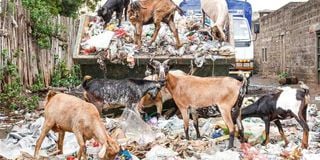Premium
Waste management crisis hits Nakuru city as population soars

A heap of garbage piled along the streets of Elburgon Town in Nakuru County on January 4, 2023.
Nakuru is grappling with a waste management crisis, one year after it attained city status.
This is attributed to the rising population. According to the 2019 Census, Nakuru City’s population stood at 367,183.
Despite the increase in the tonnage of garbage collected, the city management still depends on the almost 50-year Gioto dumpsite, located about three kilometres from the central business district.
The dumpsite, which has been in use since 1974, has long been an eyesore and poses an environmental and health risk to residents.
When it rains, waste laced with dangerous poisons from the dumpsite, located at the upper side of Nakuru City, is normally washed into the lake.
The dumpsite was expected to be relocated from the area, but Governor Susan Kihika, just like her predecessors Kinuthia Mbugua and Lee Kinyanjui, appears to have shelved the plans.
The idea to relocate the dumpsite was mooted during Governor Mbugua’s regime.
Technology
The current government now wants to invest in technologies that convert waste into energy.
“The County Government of Nakuru is forging partnerships with the private sector aimed at promoting investments in technologies that convert solid waste into fertiliser and energy. Proper sanitation programmes, including adequate landfill sites, can help our devolved unit to improve the current state of solid waste management and save money,” said Environment, Energy, Natural Resources and Climate Change Chief Officer Kennedy Barasa.
“We must urgently exploit the energy potential stored in waste through available waste-to-energy technologies and also put in place a strategic action plan for implementation of these technologies,” he said.
Speaking when he toured Gioto dumpsite in London estate, Mr Barasa said generation of power from waste has the potential of reducing environmental degradation and increasing employment opportunities.
The Kinyanjui administration in 2020 embarked on the rehabilitation of the 30-acre dump site. An earth embankment and buffer greenery were put up to prevent the spillage of garbage into the Nakuru-Kabarak road during the rainy season.
The Environment Department has also demarcated the dumpsite into portions where recyclable and biodegradable garbage are dumped separately.
However, environmentalists are opposed to rehabilitation efforts.
“We demand the relocation of Gioto dumpsite because it remains a health hazard and endangers life in Lake Nakuru. Despite the rehabilitation, when it rains dangerous poisons and metals are washed into the lake and to Njoro River,” said Mr James Wakibia, an environmental activist.
Members of the civil society led by the Peoples’ Power Watch lobby and Nakuru City Residents Association also want the dumpsite relocated.
“The county government must prioritise relocation of the dumpsite and look for an alternative waste disposal site to replace Gioto dumpsite, which has become a threat to the environment,” said Mr Jesse Karanja, the chairman of People's Power Watch.
In 2016, the National Environment Management Authority said the dumpsite did not meet the required minimum standards and that it was not at a suitable location.





